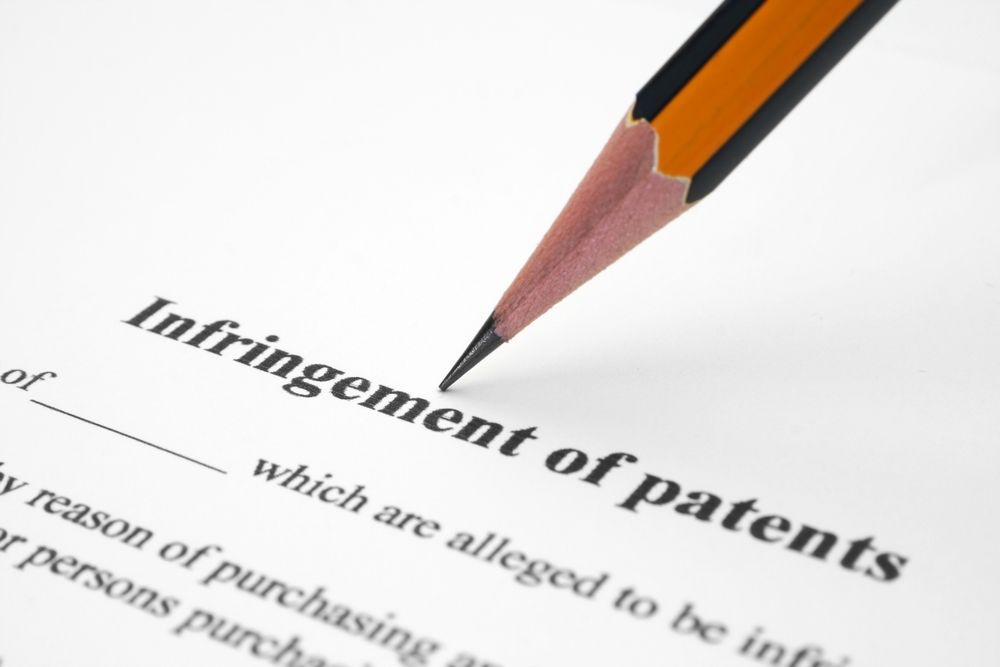RAMEY LLP FILES NEW SUIT ON BEHALF OF WFR IP LLC
RAMEY LLP's client WFR IP,LLC sues LENOVO(UNITED STATES), INC

RAMEY LLP's client WFR IP,LLC sues LENOVO(UNITED STATES), INC over U.S. Patent 7,505,793. The technology of the patent in suit generally covers WIRELESS EARPIECE ASSEMBLY. RAMEY LLP filed WFR IP's. Original Complaint and demand for jury trial seeking relief from patent infringement December 20,2023 in the Western District of Texas.
Ramey LLP is a full-service litigation law firm working with a national client base from our Houston, Texas office. We are dedicated to enhancing client results through efficient practice management, innovative technologies and the use of skilled professionals.

By Karen Molina
•
09 Jul, 2024
Understanding Intellectual Property Law Intellectual property (IP) can be a game-changer for businesses and startups, offering protection for your most valuable assets—your ideas. This blog is designed to introduce you to the different types of intellectual property law, explain their importance, and show you how to protect your business. Whether you're a business owner or an entrepreneur, understanding IP can save you a lot of headaches and potential legal battles down the road. The Essence of Intellectual Property Law Intellectual property rights refers to creations of the mind, such as inventions, literary and artistic works, designs, symbols, names, and images used in commerce. The law provides four main types of protection: Copyright infringement Trademark Patent infringement Trade Secret Each type serves a unique role in safeguarding your business assets, from your brand name to your innovative products. By the end of this guide, you'll be equipped with the knowledge to protect your intellectual creations effectively. What is Copyright and What Does It Protect? Copyright is a legal term for protection granted to the creators of original works of authorship, commonly referred to as the intellectual property (IP) system, including literary, computer software, dramatic, musical, and certain other intellectual works. This protection is available to both published and unpublished works. For small businesses and entrepreneurs, copyright can cover digital content, software, and various creative works. Digital content like blogs, eBooks, and online articles are automatically protected under copyright law once created. However, registering your copyright can provide additional legal benefits if someone infringes it. Software, a critical asset for many tech startups, also falls under copyright protection, allowing business owners to safeguard their code and prevent unauthorized use. To protect your IP rights, ensure you have clear documentation of your creation process and consider registering your copyright with the U.S. Copyright Office. In the United States, patents and copyright are regulated exclusively by federal law, as outlined in the Intellectual Property Clause. This step can be crucial in proving ownership if your work is copied or misused. Trademark Law Protects Your Brand Identity Trademarks protect symbols, names, and slogans used to identify goods and services. A strong trademark can become one of your company's most valuable assets, helping customers recognize your brand and differentiating you from competitors. The process of obtaining a trademark involves: Conducting a trademark search to ensure your mark isn't already in use. Filing an application with the United States Patent and Trademark Office (USPTO). Responding to any office actions from the USPTO examining attorney. Avoid common mistakes like choosing a mark that is too generic or descriptive, not conducting a thorough trademark search, and failing to monitor and enforce your trademark. Real-world case studies, such as the legal battles companies face over similar logos or names, illustrate the importance of securing trademark protection early. Patent Law for Protecting Innovation Being a patent owner provides an exclusive right to inventors for their inventions, allowing them to exclude others from making, using, or selling the invention for a certain period. There are three main types of patents: Utility Patents for new and useful inventions or discoveries. Design Patents for new, original, and ornamental designs for an article of manufacture. Plant Patents for new and distinct, invented, or discovered asexually reproduced plants. The patent application process can be complex, involving detailed documentation, claims, and often the assistance of a patent attorney. For small businesses, having a patent can be a significant competitive advantage, as it can prevent others from copying your innovative products. Look at real-world examples like the rise of successful startups that leveraged patents to protect their market position and attract investors. Understanding the types of patents and the application process can help you see if pursuing a patent fits your business strategy. With Ramey LLP, rest assured that from utility patents that protect functional aspects to industrial design patents that guard aesthetics, your patents are fortified against competition Trade Secret Law for Safeguarding Confidential Information Trade secrets encompass formulas, practices, processes, designs, instruments, or compilations of information not known to the public and provide a business advantage. To protect trade secrets, take steps such as: Implementing confidentiality agreements with employees and partners. Ensuring physical and digital security measures are in place. Regularly updating and monitoring access to sensitive information. Comparing trade secrets to other forms of IP, trade secrets can be advantageous as they do not require registration and can last indefinitely, as long as they remain confidential. However, they lack the formal protections offered by patents, trademarks, and copyrights.

By Karen Molina
•
05 Jul, 2024
Car accidents are sudden, stressful, and can leave lasting impacts beyond the immediate physical and emotional trauma. If you've recently been in a auto accident, you might be overwhelmed with questions about your legal rights and what steps to take next. This blog aims to provide essential legal tips tailored for car accident victims, helping you make informed decisions during this challenging time. Immediate Actions to Take After a Car Accident Car accidents can be chaotic, but taking the right steps immediately can make a significant difference in both your recovery and any potential personal injury case. 1. Ensure Safety First: Before anything else, check if anyone is injured and call emergency services and seek medical treatment. Your safety and well-being are the top priorities. 2. Gather Evidence: If it’s safe, document the scene by taking photos of the vehicles, road conditions, and any visible minor or severe injuries. This evidence will be invaluable later. 3. Contact Authorities: Always report the traffic accident to the police. Their official report can play a crucial role in your personal injury case. Understanding Your Legal Rights Comprehending your legal rights is crucial following a car accident. This knowledge can help you protect yourself and ensure you get the financial compensation you deserve. 1. Know Car Accident Laws: Laws vary by state, so familiarize yourself with local regulations. Some states follow "no-fault" laws, while others base claims on who is at fault. 2. Insurance Coverage: Understand what your car insurance covers. Typically, policies cover medical bills or physical therapy, property damage, and sometimes lost wages. 3. Seek Legal Advice: Consulting a personal injury lawyer early can provide clarity on your situation. They can guide you through the complexities of your case. Tips for Dealing With Insurance Companies Dealing with insurance companies is often one of the most stressful aspects after a car accident. Knowing how to handle this can prevent common pitfalls. 1. Be Honest but Cautious: Always tell the truth, but be careful with your words. Insurance adjusters may use your statements against you. 2. Avoid Quick Settlements: Don’t rush to accept the first settlement offer. It may not fully cover your expenses and long-term needs. 3. Document Everything: Keep detailed records of all communications with the insurance company, including names, dates, and summaries of conversations. The Role of a Car Accident Attorney Having a car accident attorney can significantly impact the outcome of your case. Here’s how they can help: 1. Expertise in Legal Processes: Personal injury lawyers specialize in cases like yours and understand the nuances of the legal system. 2. Negotiation Skills: Attorneys can negotiate with insurance companies on your behalf to ensure you get a fair settlement. 3. Peace of Mind: Knowing that a professional is handling your case allows you to focus on any mental or physical recovery without the added stress of legal battles. Why You Should Seek a Personal Injury Lawyer for a Car Accident Seeking the assistance of a personal injury lawyer after a car accident is a pivotal step to ensure that your rights are protected and that you receive fair compensation you deserve. Personal injury lawyers bring a wealth of expertise and knowledge to the table, which can be critical in navigating the complexities of personal injury law. They can help you understand the full extent of your legal options and potential entitlements, which can be particularly intricate due to state-specific laws and regulations. A seasoned lawyer can conduct a thorough investigation, gather crucial evidence, and enlist expert testimonies if necessary to build a solid case on your behalf. They are skilled negotiators who can challenge insurance companies' tactics aimed at minimizing payouts and work tirelessly to secure a fair settlement. Moreover, having a lawyer means you have someone who can handle all the legal procedures, court filings, and deadlines, sparing you from the overwhelming legal intricacies while you focus on your physical health. Ultimately, a personal injury lawyer acts as your advocate, ensuring you are not taken advantage of during an already stressful time. They provide invaluable peace of mind by shouldering the legal burden and advocating assertively on your behalf, enhancing your chances of a favorable outcome. Can You Get a Lawyer Whether You Are the Crash Victim or the Distracted Driver at Fault? Absolutely, you can seek legal representation whether you are the crash victim or the distracted driver at fault. For crash victims, a personal injury lawyer can help secure compensation for medical expenses, property damage, lost wages, and other related costs. They can investigate the accident, gather evidence, and build a strong case to prove the fault and extent of injuries. On the other hand, if you are the driver at fault, an attorney can still be invaluable. They can offer legal help to minimize your liability and potentially reduce financial or legal repercussions. They can assist in negotiating with insurance companies and represent you in court if necessary. In some cases, they might also explore avenues for settlements or plea bargains to alleviate severe penalties. It’s crucial to have skilled legal counsel to navigate the complexities of either situation and ensure your rights are protected. How Long Can I Expect Physical Recovery to Take After a Car Accident? The duration of physical rehabilitation after a car accident varies widely depending on the severity of the injuries sustained and the individual's overall health. Minor injuries such as bruises and small cuts may heal within a few days to weeks, while serious injuries causing physical pain like broken bones, whiplash, or internal injuries can take months to fully recover. Rehabilitation and physical therapy may be necessary for a more serious injury that affect mobility or muscular function, further extending the recovery timeline. It's also important to consider the psychological impact of a car accident, as emotional and mental recovery can take additional time and may require counseling or therapy. Patients should follow their healthcare provider's recommendations closely to ensure a safe and effective recovery process, and it’s advisable to consult with medical professionals regularly to monitor progress. Conclusion Dealing with the aftermath of a car accident is daunting, but understanding your legal rights and knowing the right steps to take can make a significant difference. Remember to act quickly, document everything, and seek reputable law firm like Ramey LLP to ensure you receive the compensation you deserve. If you're unsure where to start, consider reaching out to a personal injury lawyer who can guide you through the process and help you achieve the best possible outcome for your case.

26 Jun, 2024
Getting into a car accident is stressful and overwhelming. Sometimes, you may feel okay immediately after the incident, only to discover days or even weeks later that things aren't quite right with your body. It's crucial to recognize these delayed injury symptoms to protect your health and well-being. In this blog post, we'll walk you through the common delayed personal injury symptoms after a auto accident, why these symptoms might appear later, and why it's essential to seek medical attention even if you feel fine initially. We'll also cover some legal and insurance considerations and offer tips on managing delayed symptoms effectively. Let's get started! Understanding the Importance of Delayed Injury Symptoms Car accidents often trigger an adrenaline rush that can mask pain and injury in the immediate aftermath. However, it's vital to understand that some injuries don't manifest right away. Recognizing these delayed symptoms can make a significant difference in your recovery process. Delayed injuries symptoms can range from mild discomfort to severe injuries. They might indicate underlying issues that need medical attention. Ignoring these symptoms can lead to long-term health problems, making early detection crucial for effective treatment. Staying informed about potential delayed injury symptoms is a proactive step toward ensuring your overall well-being. Let's explore the most common delayed symptoms you should watch out for. Common Delayed Injury Symptoms to Watch For After a car accident, certain symptoms may not appear until days or weeks later. Here are some of the most frequent delayed injury symptoms: Soft Tissue Injuries Soft tissue injuries, common after car accidents, affect muscles, tendons, and ligaments, including sprains, strains, contusions, and whiplash. Whiplash is frequent in rear-end collisions, causing delayed neck pain, stiffness, and headaches. Monitoring unusual soreness or restricted movement is crucial, as early intervention can prevent complications. Whiplash Whiplash is a neck injury caused by a sudden jerking motion, commonly experienced in rear-end collisions. Symptoms may include neck pain, stiffness, headaches, and dizziness. These signs might appear hours or even days after the accident. Concussion A concussion is a mild traumatic brain injury that can occur due to a blow to the head or violent shaking. Symptoms can be subtle and may include headaches, confusion, memory problems, and sensitivity to light or noise. It’s essential to monitor any changes in cognitive function. Traumatic Brain Injuries Traumatic brain injuries (TBIs) are more severe than concussions and can cause long-lasting health effects. They result from significant brain damage due to external forces like blows or bumps. Symptoms include persistent headaches, seizures, slurred speech, loss of coordination, cognitive issues, and mood changes. After a car accident, seek immediate medical attention if any symptoms appear. Early diagnosis and intervention are essential for better outcomes. Back Injuries Back injuries, including herniated discs and muscle strains, can develop over time. Symptoms may include back pain, numbness, tingling, and reduced mobility. Even minor discomfort should be evaluated by a healthcare professional. Spinal Injury Spinal cord injuries are another serious concern following a car accident and can result in long-term health issues if not promptly addressed. These injuries might not be immediately apparent but can progress over time, leading to significant discomfort and mobility challenges. Symptoms of spinal injuries may include persistent back or neck pain, numbness, tingling sensations in the extremities, and weakness in the limbs. Abdominal Pain Abdominal pain is another symptom that can develop well after a car accident. This type of pain may be indicative of internal injuries, such as organ damage, internal bleeding, or seatbelt syndrome, which can cause bruising and damage to the abdominal wall. Symptoms to watch for include persistent or worsening abdominal pain, swelling, tenderness, and bruising. Nausea and vomiting can also be associated with internal injuries. Post-Traumatic Stress Disorder (PTSD) In addition to physical injuries, car accidents can also lead to serious psychological issues, such as Post-Traumatic Stress Disorder (PTSD). PTSD is a mental health condition triggered by experiencing or witnessing a traumatic event. It's common for individuals involved in car accidents to develop PTSD, and symptoms can surface well after the incident. Symptoms of PTSD may include vivid flashbacks, nightmares, severe anxiety, and uncontrollable thoughts about the accident. Individuals might also experience emotional numbness, irritability, and difficulty concentrating. These symptoms can interfere with daily life, making it difficult to function at home, work, or school. Why Do Delayed Symptoms Occur? Understanding why delayed injury symptoms occur can help you take better care of yourself after a car accident. Here are some physiological reasons behind delayed symptoms: Adrenaline and Stress Response During a car accident, your body releases adrenaline, a hormone that prepares you for a fight-or-flight response. This surge of adrenaline can temporarily mask pain and injury, causing you to feel "fine" immediately after the accident. Inflammation and Healing Process Injuries often lead to inflammation, a natural part of the body's healing process. However, inflammation can take time to develop, resulting in delayed symptoms. Swelling and pain might not be noticeable until a few days later. Muscle Tension and Strain Muscle tension and strain are common after a car accident. The impact can cause muscles to tighten and contract, leading to pain and stiffness that may not be immediately apparent. These symptoms can gradually worsen over time. Being aware of these physiological responses can help you understand the importance of monitoring your health after an accident. The Importance of Seeking Medical Help Even if you feel fine after a car accident, seeking medical treatment is crucial. Here’s why: Early Detection of Injuries A healthcare professional can detect injuries that may not be immediately apparent. Early diagnosis allows for timely treatment, reducing the risk of complications and promoting faster recovery. Preventing Long-Term Health Issues Delayed injury symptoms can indicate underlying conditions that require medical intervention. Ignoring these symptoms can lead to chronic pain, mobility issues, and other long-term health problems. Peace of Mind Consulting a healthcare professional provides peace of mind. Knowing that you've been thoroughly evaluated can alleviate anxiety and help you focus on your recovery. Don’t wait for symptoms to worsen—prioritize your health by seeking medical help promptly.

26 Jun, 2024
If you’ve been injured and are considering a lawsuit, understanding the Statute of Limitations is crucial. This legal term refers to the time frame within which you can file personal injury claims. Miss this deadline, and you could lose your right to recover financial compensation forever. For personal injury victims in Texas and California, knowing the specific deadlines and exceptions can make all the difference. This blog post walks you through the ins and outs of the Statute of Limitations for personal injury cases, why it’s important, and how you can overcome any challenges related to it. What is the Statute of Limitations? The statute of limitations is a law that sets the maximum time after an event within which legal proceedings may be initiated. In a personal injury case, this means you have a limited time to file a personal injury lawsuit after an accident or serious injury. Understanding this time frame is crucial for personal injury victims to ensure they don’t miss their opportunity to seek justice and financial compensation. Why is the Statute of Limitations Important? The statute of limitations serves several purposes. Firstly, it ensures that cases are brought to court while evidence is still fresh. Secondly, it provides a timeline for defendants so they can move on with their lives without the perpetual threat of a lawsuit. For plaintiffs, knowing the statute of limitations helps them act promptly to gather evidence and seek a personal injury attorney. Common Misconceptions Many people mistakenly think they have endless time to file a personal injury lawsuit. Others may not even realize that such a limitation exists. This misunderstanding can lead to missed opportunities for justice and compensation. Therefore, being aware of the statute of limitations is crucial for any personal injury victim. Statute of Limitations in Texas In Texas, the statute of limitations for personal injury cases is generally two years from the date of the injury. However, there are some key details and exceptions you should be aware of. Key Details The two-year period applies to a personal injury case, including those involving car accidents, slip and falls, and medical malpractice. However, the clock starts ticking from the date of the injury, not from when you decide to file a personal injury lawsuit. Exceptions to the Rule There are exceptions to this rule. For instance, if the injured party is a minor, the statute of limitations may be extended until they reach the age of 18. Additionally, if the injury was not discovered immediately, the 'discovery rule' may apply, extending the time frame. Real-Life Examples Consider the case of John Doe, who was injured in a car accident in Houston. He initially ignored his minor injuries, but months later, discovered they were more severe. Fortunately, he consulted a personal injury lawyer just in time to file a personal injury claim within the two-year period. Missing this window could have cost him thousands in medical bills, lost wages and damages. Statute of Limitations in California California has its own set of rules regarding the statute of limitations for personal injury lawsuits. Understanding these is equally important for personal injury victims in the Golden State. Detailed Discussion In California, the statute of limitations for personal injury cases is generally two years from the date of the injury, similar to Texas. However, specific situations and types of claims can have different time frames. Comparison with Texas and Other States While both Texas and California share a two-year statute of limitations for personal injury cases, other states may have different deadlines. For example, in New York, the limit is three years. This variation highlights the importance of knowing your specific state’s laws. The Role of the Statute of Limitations in Personal Injury Cases The statute of limitations plays a critical role in personal injury cases. It affects the legal process and the rights of victims in several ways. Impact on Legal Proceedings The statute of limitations determines whether a court can hear your case. Filing a personal injury lawsuit after this period usually results in dismissal, regardless of the case's merits. Therefore, acting promptly is essential. Strategies for Managing Limitations To manage the statute of limitations effectively, it’s crucial to document everything related to your injury promptly. Keep records of medical treatments, communications, and any other relevant information. Consulting a lawyer early can also help you understand your time frame and prepare your case efficiently. Importance of Early Legal Advice Seeking legal representation as soon as possible after an injury can significantly impact your ability to file a successful claim. Personal injury lawyers can guide you through the legal maze, helping you gather necessary evidence and file your claim within the stipulated time. What Qualifies as a Personal Injury? Personal injury law, also known as tort law, encompasses a wide range of situations where individuals suffer harm due to the actions or negligence of others. Various incidents can qualify as personal injuries, including but not limited to car accidents, slip and fall accidents, medical malpractice, and workplace injuries. Types of Personal Injury Cases Car Accidents : One of the most common types of personal injury cases. Victims can seek compensation for medical expenses, lost wages, and damage to their vehicles. Slip and Fall : Occurs when a person slips, trips, or falls due to hazardous conditions on someone else's property. Property owners may be held liable if they neglected to address unsafe conditions. Medical Malpractice : Involves injuries caused by healthcare professionals who fail to provide the standard level of care. These cases can include surgical errors, misdiagnoses, and medication mistakes. Workplace Injuries : Employees injured on the job might seek compensation beyond workers' compensation if employer negligence played a role. Understanding what qualifies as a personal injury is crucial for victims looking to seek justice and obtain a experienced personal injury lawyer to pursue compensation. Overcoming Statute of Limitations Challenges Reaching the end of the statute of limitations period doesn’t necessarily mean all hope is lost. There are ways to overcome these challenges. Legal Options for Late Filings If you’re approaching or have surpassed the statute of limitations, certain legal doctrines like 'tolling' can offer relief. Tolling pauses the statute of limitations under specific circumstances, such as the plaintiff being a minor or mentally incapacitated at the time of the injury. Practical Advice Gathering all relevant documents and evidence promptly can make a huge difference. This includes medical records, witness statements insurance company interactions, and any other documentation that supports your claim. Ramey LLP: Your Trusted Personal Injury Lawyers Ramey LLP offers personal injury lawyers in Texas and California, dedicated to providing expert legal assistance tailored to your unique needs. Our experienced attorneys understand the nuances of state-specific laws and are committed to ensuring you receive the compensation you deserve. Contact us today for further legal assistance and take the first step towards justice and recovery.

Contact Us
Contact Us
Thank you for contacting us.
We will get back to you as soon as possible
We will get back to you as soon as possible
Oops, there was an error sending your message.
Please try again later
Please try again later



